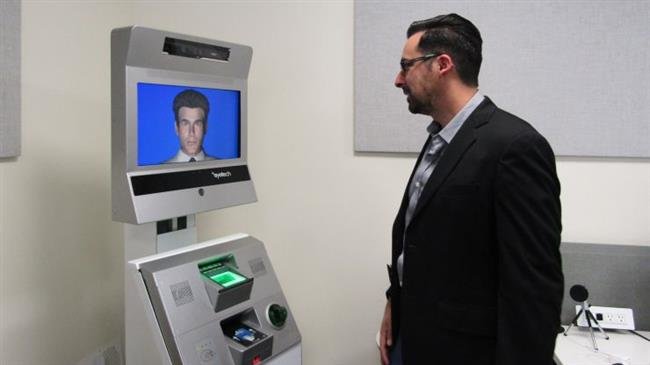EU: Controversial border ‘lie detector’ put to test in Hungary, Greece and Latvia
The European Union-funded IBORDERCTRL project has begun testing its “smart lie-detection systems” at EU borders in Hungary, Greece and Latvia, despite concerns raised regarding their effectiveness.
Before launching the six-month trial of the systems on Thursday, the European Commission released a statement detailing how the automated controls will work explaining that the “system has been set up so that travelers will use an online application to upload pictures of their passport, visa and proof of funds, then use a webcam to answer questions from a computer-animated border guard, personalized to the traveler’s gender, ethnicity and language.”
The system will then check the validity of the traveler’s information based on their facial “micro-expressions”, marking potentially lying travelers as a “risk” that have to be put through more detailed examinations by further automated and ultimately manual border checks.
Project coordinator George Boultadakis believes the systems face an optimistic market opportunity based on Europe’s fragile and overloaded immigration situation, adding that “the global maritime and border security market is growing fast in light of the alarming terror threats and increasing terror attacks taking place on European Union soil, and the migration crisis.”
Developers, however, do not deny possibly false detections, admitting that the systems currently have a success rate of no more than 76 percent, but that they remain “quite confident” that the new examinations can help them raise the system’s accuracy to 85 percent.
The persistent margin of failure in lie detection has, however, led to concerns among experts and civil liberties groups about the effectiveness of the system.
Senior University of Amsterdam lecturer in forensic psychology Bruno Verschuere affirms that “non-verbal signals, such as micro-expressions, really do not say anything about whether someone is lying or not,” speaking to the Dutch newspaper De Volskran.
Furthermore, Bennett Kleinberg, University College London data science professor, believes that the lie-detecting technologies “can lead to the implementation of a pseudoscientific border control.”
Moreover, some observers have criticized what they see as potentially authoritarian and subversive implications of the automated lie-detecting systems by government bodies.
Source: Presstv
Now that you are here
The Cameroon Concord News Group Board wishes to inform its faithful readers that for more than a decade, it has been providing world-class reports of the situation in Southern Cameroons. The Board has been priding itself on its reports which have helped the world to gain a greater understanding of the crisis playing out in Southern Cameroons. It hails its reporters who have also helped the readers to have a broader perspective of the political situation in Cameroon.
The Board wishes to thank its readers who have continued to trust Southern Cameroon’s leading news platform. It is therefore using this opportunity to state that its reporters are willing to provide more quality information to the readers. However, due to the changing global financial context, the Board is urging its readers to play a significant role in the financing of the news organization. It is therefore calling on its faithful readers to make whatever financial contribution they can to ensure they get the latest developments in their native Southern Cameroons, in particular, and Cameroon in general.
Bank transaction: Soter Tarh Agbaw-Ebai
Banking IBAN: GB51 BARC 2049 1103 9130 15
Swift BIC BARC GB22XX
SORT CODE 20-49-11, ACCOUNT NUMBER – 03913015 Barclay PLC, UK
The Board looks forward to hearing from the readers.
Signed by the Group Chairman on behalf of the Board of Directors
Soter Tarh Agbaw-Ebai
Email: soteragbawebai@gmail.com





